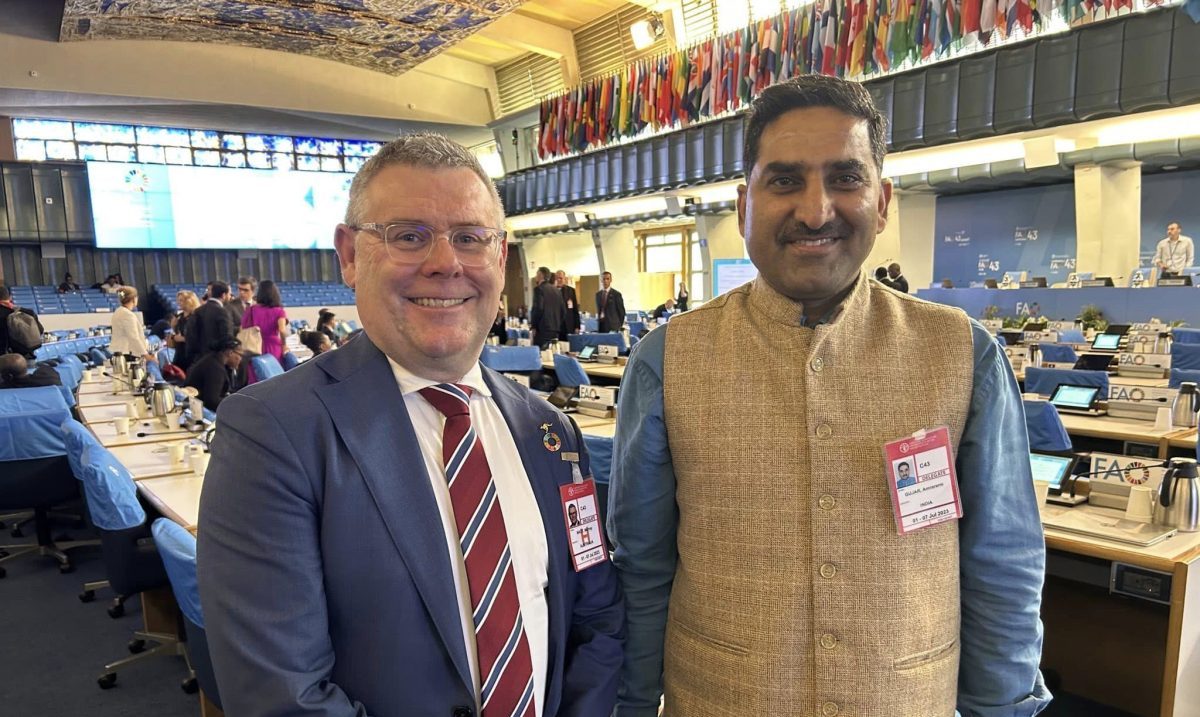
Australian Agriculture Minister Murray Watt and India’s Deputy Chief of Mission in Rome, Amararam Gujar, at the UN Food and Agriculture Organization conference in Rome. Photo: Office of Murray Watt
THE Australian grains industry is working to strengthen ties with India, participating in a three-day Ministerial visit scheduled for 3-5 July.
Led by Federal Agriculture Minister Murray Watt, the delegation, including GrainGrowers, the National Farmers Federation and a cross-section of industry representative bodies, will look to showcase the quality, safety and reliability of Australian agricultural products.
Mr Watt is travelling to India from Rome, where he has been part of the Australian delegation at the UN Food and Agriculture Organization conference.
GrainGrowers chief executive officer Shona Gawel said India was a valued market for Australian grain growers.
“India already has the second largest population in the world as well as the world’s largest pulse market, and its continued growth presents a substantial ongoing opportunity for Australian grains,” Ms Gawel said.
“As one of Australia’s most important Indo-Pacific partners, and with the relationship characterised by strong people-to-people links, trade delegations such as this are a great opportunity to promote the high quality of our products.”
Ms Gawel said mutual opportunities exist for Australia to assist India build its food and nutrition security.
“While India continues to face the challenge of under-nutrition and protein deficiency the grains sector can play a key role, with pulses having the potential to provide the most economical vegetable protein.
Ms Gawel thanked Mr Watt for his ongoing commitment to promoting Australian agricultural trade.
“Productive trade arrangements are often about relationships. I am optimistic about future trade
with India and look forward to continued collaboration in the coming years,” she said.
More talk with China
Mr Watt also met with China’s Minister of Agriculture and Rural Affairs Renjian Tang in what has been labelled another step towards stabilising the relationship between the two countries.
The meeting is the first between Australia’s and China’s agriculture ministers since 2019.
It follows meetings in recent months between Australian Prime Minister Anthony Albanese and China’s President Xi Jinping, and meetings between Australian Foreign Minister Penny Wong and Trade Minister Don Farrell and their counterparts.
“My meeting with Mr Tang and his delegation in Rome was very productive,” Mr Watt said.
“The meeting provided the opportunity to continue to stabilise the relationships between our two countries and to explore areas of joint co-operation.
“There is a shared interest in exploring opportunities for agricultural collaboration, including in the areas of sustainability, technology, biosecurity and soil health.
“I welcomed progress we have seen in recent times in resolving trade impediments, particularly relating to cotton and timber.
“But I also made clear that there is still more to be done and that we wish to see China remove trade impediments that remain in place, particularly in relation to barley, wine, beef and rock lobster.
“I was heartened by feedback from Mr Tang that Chinese demand for high quality Australian agricultural produce remains strong.
Mr Watt also met with several key EU agriculture ministers on the sidelines of the FAO conference as negotiations ramp up to conclude a trade agreement between Australia and the EU.
“It was very useful to meet with the European Union’s Agriculture Commissioner, along with agriculture ministers and officials from Germany, Spain, Ireland, Sweden, Slovakia, Poland, Portugal and others, to reaffirm Australia’s strong desire to see the deal come to fruition.”
“However I strongly reiterated to them that Australia would not sign a deal, unless it offers commercially meaningful markets for our agricultural producers.”
While at the FAO Conference, Mr Watt had the opportunity to respond to the McDougall Lecture, delivered by Singapore’s Senior Minister Tharman Shanmugaratnam.
Frank McDougall was a prominent Australian economist and farmer who played a key role in establishing the FAO in 1945 and the annual lecture named after him is an opportunity for world leaders to outline key global agricultural concerns.
Source: GrainGrowers, Department of Agriculture and Fisheries

HAVE YOUR SAY